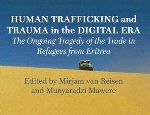Human trafficking in the digital era, trauma and the involvement of the Eritrean regime
Published on Thu, 2017-03-16 21:01
The book entitled "Human Trafficking and Trauma in the Digital Era: The Ongoing Tragedy of Trade in Refugees from Eritrea" sheds new light on the thriving business of human trafficking for ransom with severe torture practices, also named Sinai trafficking, and traces back its origins. It presents the findings that show how money is made with the smuggling of Eritrean refugees and how the booming business runs with inhuman practices such as violence, hostage situations and torture. This comes with a detrimental effect to the Eritrean community, which suffers collective trauma due to bearing witness to abuse of family members and fellow nationals through mobile phones and digital social networks. Tracing the origins of the problem lead to Eritrea The authors managed to identify the criminal network behind the business and found traces that lead to the Eritrean regime. The book reveals a complex regional system in which Eritrean refugees are driven out of their own country by a deliberate policy of slavery, deliberate impoverishment and human rights abuses. Eritreans that flee are forced to put their fate in the hands of government officials, military personnel and criminal gangs. It is a system that is maintained by the tacit approval and involvement of the Eritrean government. ICT as a means to exchange money and fuel fear and desperation. The use of information communication technologies (ICT) plays a crucial role in the new modus operandi of the human trafficking business: mobile phones are used to extort money and collect ransom from family members of the victims. Co-author and Eritrean human rights activist Selam Kidan concludes that ICT facilitates widespread trauma beyond the primary victims of human trafficking. ICT spreads the stories and tragedies of their fellows that leave many with feelings of desperation, vulnerability and shame. Those narratives are integrated into a collective consciousness and cause the traumatisation of an entire community. An urgent need for accountability. The role of the EU. The book also does not fall short of reflecting on the tragedies in a wider perspective and brings attention to the fact that there is a clear need for accountability and justice. This is also a call on the European Union which pursues ever greater migration control mechanisms and seeks increasing cooperation with governments that turn a blind eye to the illicit billion dollar business at the cost of Eritrean refugees. The authors of the book urge the European Union to take responsibility and stop the deterrence of Eritrean refugees; they call on regional governments to control public officials and to actively prosecute trafficker gangs. The most important fact the book highlights is that new policies are needed which tackle the problem that fuels this system. These policies must address the current situation in Eritrea to stop the thriving business of smuggling refugees. The authors After over five years of field work Professor at Tilburg University and Leiden University Mirjam van Reisen and Professor Munyaradzi Mawere from Great Zimbabwe University launched their new book entitled "Human Trafficking and Trauma in the Digital Era: The Ongoing Tragedy of Trade in Refugees from Eritrea" last 10 March 2017. The book is contains contributions from authors from various disciplines. This approach does justice to the complexity of the issue and provides a comprehensive analysis of human trafficking and the roots of migration thanks to contributions from authors and experts such as Professor Mirjam van Reisen at the Universities of Leiden and Tilburg in the Netherlands, Professor Munyaradzi Mawere at the Great Zimbabwe University, the Swedish-Eritrean journalist and Eritrea-expert Meron Estefanos, the Eritrean human rights lawyer Daniel Mekonnen, the South African journalist and expert Martin Plaut and the Eritrean human rights activist and psychotherapist Selam Kidane. Source: EEPA. |
SUSCRIBE TO OUR NEWSLETTER



